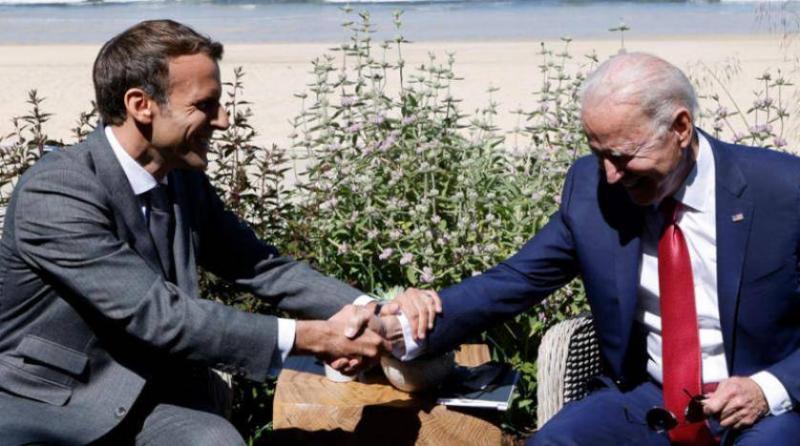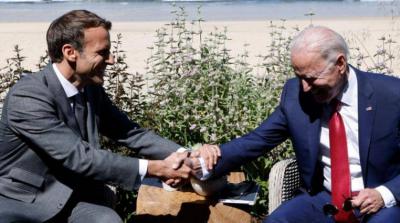Leaders of the Group of Seven (G7) dedicated their second day of meetings yesterday to addressing the challenges posed by China, while also developing a global plan for infrastructure aimed at poorer nations. They pledged to mobilize significant resources to combat future pandemics. U.S. President Joe Biden was keen to rally his allies to face challenges posed by China and Russia during this summit that includes heads of state and government from Germany, France, Italy, the United Kingdom, Canada, and Japan and is taking place in southwestern England until Sunday.
The final communiqué of the G7 summit, expected today, will likely include an initiative launched by the U.S. for a “better rebuilding of the world.” The economic powers of the group plan a major initiative focused on infrastructure in poorer countries, in an attempt to counter China's Belt and Road Initiative, which is valued in the trillions of dollars and referred to as the “New Silk Road.” U.S. officials announced the initiative yesterday (Saturday), stating that estimates indicate a $40 trillion gap in parts of the world that the initiative aims to help other countries bridge.
While no concrete financial commitments have been made, officials noted that the United States, its G7 partners, the private sector, and other stakeholders "will soon collectively mobilize hundreds of billions for infrastructure investments in low and middle-income countries." The G7 leaders participated in a series of joint working sessions and bilateral meetings, joined by their counterparts from South Korea, South Africa, and Australia, as well as United Nations Secretary-General Antonio Guterres. Indian Prime Minister Narendra Modi is attending virtually due to the health situation in his country.
The leaders are determined to achieve "historic" progress by adopting an action plan to combat future pandemics in a display of unity in the face of the COVID-19 crisis. So far, heads of state and government from Germany, France, Italy, the UK, Canada, Japan, and the U.S. have shown consensus. The leaders delved into substantive discussions on methods to combat the health crisis before continuing informal talks on Saturday evening over a beach barbecue. After promising to supply vaccines to poorer countries, they are seeking to identify means to prevent a repeat of the global disaster currently being experienced.
British Prime Minister Boris Johnson welcomed the "Carbis Bay Declaration" proposed by the G7 to prevent the outbreak of future pandemics, calling it a "historic moment." He tweeted that "under this agreement, the leading democracies of the world commit to preventing another global pandemic and ensuring that the devastation caused by COVID-19 is never repeated."
The document outlines a series of commitments to prevent the emergence of a new pandemic, including reducing the timeframes for developing vaccines, treatments, and diagnostics, with the hope that the world will be prepared in less than one hundred days for any emergency disease. The second part of the text addresses strengthening health monitoring and implementing reforms for the World Health Organization to enhance its effectiveness, a goal that is hard to achieve without China, which the G7 considers a "group" formed by Washington.
The declaration does not resolve a contentious issue regarding lifting patents on vaccines to expedite their production, a matter supported by the U.S. and France, but opposed by Germany. China and Russia were at the center of discussions on Saturday about foreign policy, during which leaders expressed their intent to affirm their liberal democratic values. A senior U.S. official remarked that "the issue is not about pressuring countries to choose between the U.S. and China, but rather offering an alternative vision and approach."
This first in-person summit in nearly two years presents an opportunity for progress among the countries on contentious bilateral issues. Johnson, participating in his first summit since his country exited the European Union on January 1, has held successive bilateral meetings since morning with Macron, Merkel, and European Commission President Ursula von der Leyen. As the group leaders discussed economic topics, the British Prime Minister swiftly relinquished the floor to Italian Prime Minister Mario Draghi. Johnson introduced Draghi in a closed session held in Cornwall, southwestern England, saying, “Mario, I remember being at a seminar where you saved the euro during a crisis with a single phrase... Tell us your perspective.” Draghi, who played a crucial role during the European financial crisis as head of the ECB, urged his colleagues to consider a strategy for the medium and long term to avoid any negative market reactions that could threaten their spending plans, according to a source familiar with the discussion. Consensus emerged on this financial point, including support from U.S. President Joe Biden, who spoke about his proposals for raising corporate taxes.
### Macron: The U.S. with Biden is Back as a Cooperative Leader of the Free World
French President Emmanuel Macron told U.S. President Biden that the United States has returned as a "cooperative" leader of the free world. When asked if the U.S. had indeed returned, Biden looked at Macron, suggesting the question should be directed at the French President. Macron responded, "Yes... absolutely." He continued, "It is great to have an American President with us who is part of this gathering and has a complete desire to cooperate."




